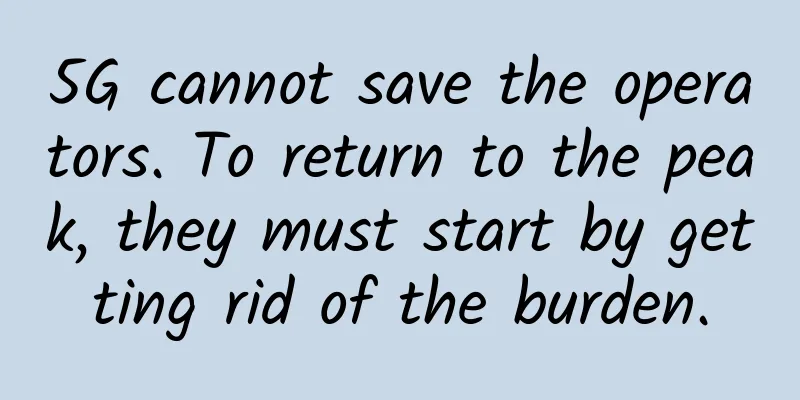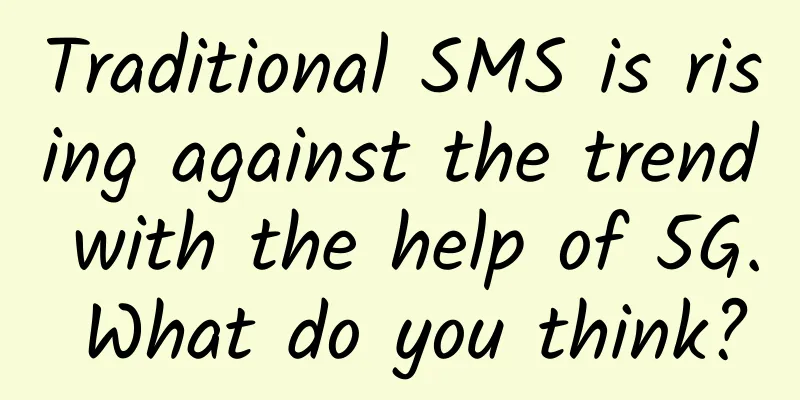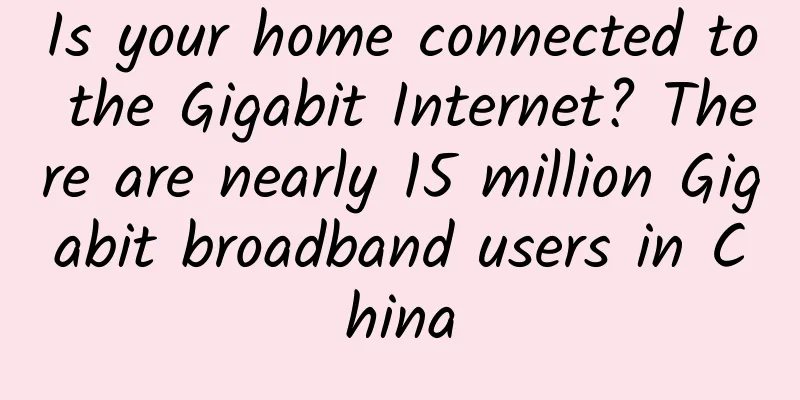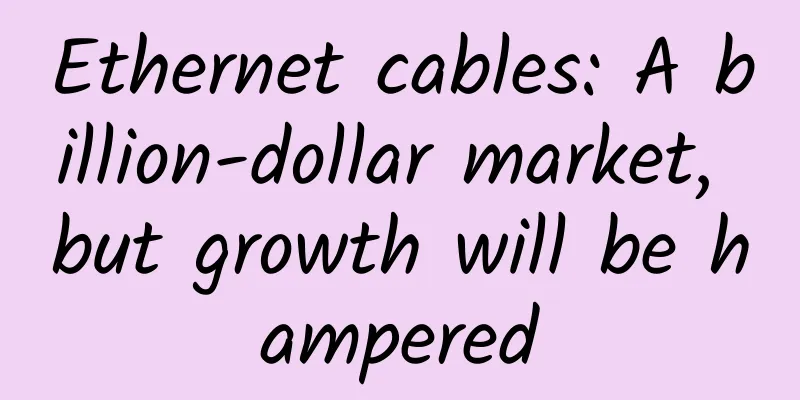5G cannot save the operators. To return to the peak, they must start by getting rid of the burden.

|
On July 25, the Ministry of Industry and Information Technology announced the economic operation of the communications industry in the first half of 2019. As expected by industry insiders, the total revenue of telecommunications business in the first half of the year was 672.1 billion yuan, a year-on-year decrease of 0.03%, entering the negative growth range. Mobile phone service enters the "useless period" The decline in revenue in the communications industry this time was considered by industry media to be a "turning point" for the communications industry. After this, the decline in revenue in the communications industry may become the norm. Some practitioners attribute this decline to "speeding up and reducing fees." In fact, even after the three major operators, under the supervision of the State Council, carried out sufficient speed-up and fee-reduction actions, the revenue of Internet data services is still growing. Among them, the mobile data business, which is the "hardest hit area" of speed-up and fee-reduction, grew by 0.7% year-on-year, and did not lag behind the overall business. Mobile Internet cumulative access traffic I believe everyone already knows that the lagging business is the call business. After entering the mobile Internet era, the call and SMS business have been squeezed by OTT business and their defense lines have been lost frequently. In the past two years, due to the emergence of SMS authentication and login services, the SMS business has begun to pick up. However, the call business is still in a "steady decline" trend and cannot extricate itself. According to the data in the first half of the year, the duration of outgoing calls on mobile phones reached 1,196.9 billion minutes, a year-on-year decrease of 6.8%, an increase of 0.1 and 1.4 percentage points respectively compared with the first quarter and the whole year of 2018. The duration of outgoing calls on fixed-line phones reached 61.4 billion minutes, a year-on-year decrease of 19.3%. Although the call service has become a waste of money, since calls and text messages have been the most important sources of income for operators in the past few decades, a charging model based on these has been formed. Therefore, in the face of changes in the Internet era, operators lament the "pipelining" while clinging to the call and text message services, and even turn a blind eye to junk text messages and harassing calls. Can 5G save operators? Operators have begun to wonder whether they can regain the lost glory in the 5G era after 3G and 4G. There is no doubt that the 5G era will bring about earth-shaking changes. Everyone and even everything may be connected to the Internet. Operators who provide basic network services should gain huge profits. However, judging from the current actions of the operators, they are probably not ready for the 5G era. Although the official 5G packages have not yet been launched, rumors about the various test packages of the three major operators are already flying around, and without exception, they are still the same: hundreds or thousands of minutes of voice calls + hundreds of text messages + unclear whether the data is enough. The reason why it is unclear whether it is enough is that these packages are almost the same as 4G packages. However, everyone knows that in the 5G era, the Internet will once again enter an explosive growth. Using the traffic of the 4G era to measure the demand of the 5G era is obviously a futile act. If we continue along this line of thinking, then we can say for sure that 5G will not save the operators. On the contrary, they will continue to decline in the same way as they did in the 3G and 4G eras. Operators will further lose their voice in the industry and eventually become “pipelines”—a treatment that may be even worse than that of a water company, as after all, the water belongs to them. Social dividends are dividends for operators Of course, the arrival of the 5G era is still a great opportunity for operators to "turn around". Whether they can seize this opportunity depends on whether they can stand from the perspective of industrial development and social responsibility, get rid of burdens and go into battle lightly - the burden here refers to the basic business model with voice calls as the core. The 5G era is no longer just about traffic. Edge computing, AIOT, AI, VR, etc. will flourish with the help of 5G, and the industry's demand for 5G will also be diverse. Even for ordinary consumers, with the widespread application of 5G, the standard for measuring services will go beyond the single dimension of traffic, and all of this is a new opportunity for operators. In the future, when consumers experience 5G-specific applications such as cloud gaming, AR/VR, and holographic video, they will have different requirements for traffic, speed, and latency. Operators can set new charging rules based on consumer applications to enhance service value. Consumers who enjoy higher-value services are naturally more willing to pay for them, rather than repeatedly struggling with the issue of choosing a package with enough traffic and thousands of minutes of useless talk time. A very simple logic: industrial development is inseparable from consumer demand. When consumer demand is released, it will naturally promote the development of the entire industrial chain. The demand for 5G on the industrial side and the dependence on operators will far exceed the consumer side - if operators do not want to continue to be reduced to "pipelines", then improving their 5G capabilities will become inevitable. It can be said that only when operators change their mindset from "calls come with network" to "network comes with calls" can they truly grasp the "life-saving straw" of 5G. |
<<: ACL (Access Control List) Principle and Application
>>: Unlimited data? 5G packages are more varied, watch out for your phone bills
Recommend
Aruba and Digital China work together to build a smart campus project
On September 19, during the Atmosphere 2017 confe...
5G network speed is so fast, the radiation must be very large
The issue of base station radiation has been wide...
DiyVM: US CN2/Hong Kong CN2 VPS monthly payment starts from 50 yuan, Hong Kong independent server starts from 499 yuan/month
DiyVM is a Chinese hosting company founded in 200...
Foreign media: South Korea encourages virtual network operators to participate in 5G competition
South Korea's Ministry of Information and Com...
How IPv6 will gradually replace IPv4
Have you noticed that many apps now have a line o...
How to deploy 5G and edge computing?
The telecommunications sector around the world is...
ITLDC: Unlimited traffic VPS limited time annual payment 40% off €22.98/year, 15 data centers in the United States/Singapore/Netherlands/Ukraine, etc.
ITLDC is currently offering an automatic 40% disc...
Xunfang and Huawei join hands to enter the era of big service 2.0, four key words to achieve consistent service experience
[51CTO.com original article] On a weekend in earl...
Maipu attended the 3rd China Military-Civilian Integration Technology and Equipment Expo
[51CTO.com original article] Recently, the 3rd Ch...
Detailed explanation of 5G communication: current status of 5G technology and future trends
Since 2016, 5G has become increasingly popular. A...
Huawei: 5G+AI opens a new era of smart city twins
On November 15, the "Huawei Smart City Summi...
my country has built the world's largest 4G network
[[181278]] On January 6, the Ministry of Science ...
In-depth: Two major challenges need to be solved to achieve mature 5G applications in the power industry
Using bits to drive watts is one of the dreams of...
Don’t worry anymore! Teach you how to quickly locate Eth-Trunk faults and easily solve network problems!
1. How to locate the problem that an Eth-Trunk in...
How to promote 5G packages in small and medium-sized cities
From the perspective of package value, the curren...




![[11.11] RackNerd: $11/year-1GB/12G SSD/2TB/San Jose/Seattle/Dallas and other data centers](/upload/images/67cabd265c307.webp)




